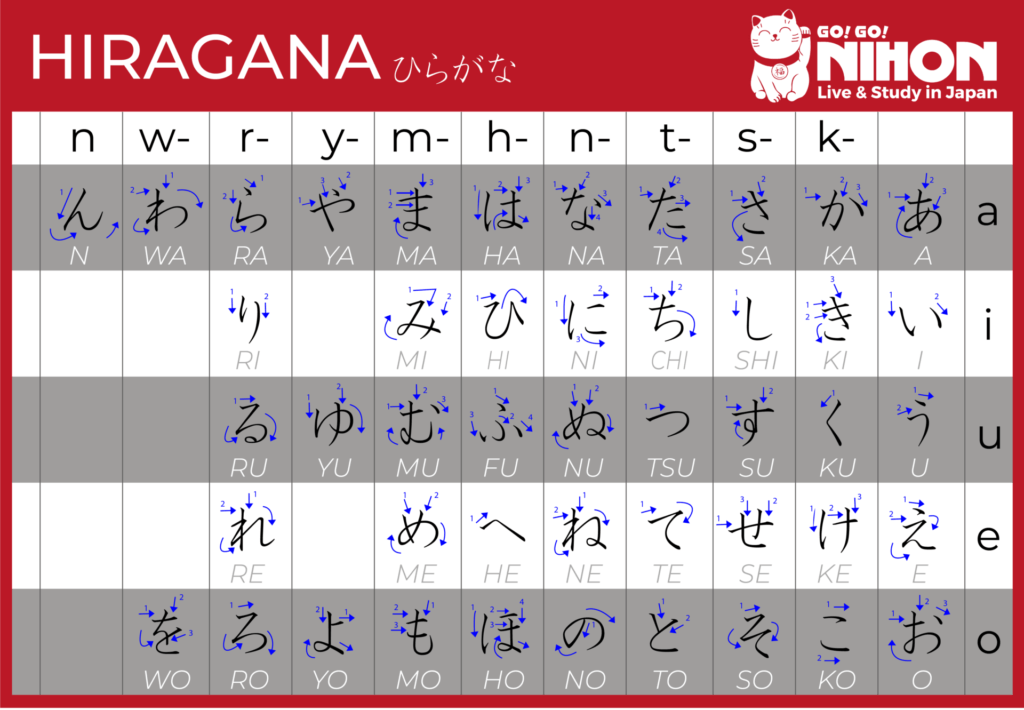There are many reasons why you might need, or want, to self-learn Japanese. It might not be possible for you to study in Japan at the moment.
Regardless of the reason, these are great opportunities to use the time to get your learning started.
Start with the basics
Getting the basics right is important when learning any language and it is no less essential when learning Japanese.
Hiragana and katakana are the very basic foundations of the Japanese language, so the quicker you know your あ from お, the faster you can progress with your Japanese. If you’re going to attend language school in Japan, most schools expect you to know at least hiragana and katakana before you begin class.
Read more about the Japanese writing system here.
Learning hiragana and katakana is straightforward and is even simpler with the right tools. Go! Go! Nihon’s own hiragana and katakana app, Hiragana Quest, helps beginners learn these essential alphabets through mnemonics. You can download it here.
If you are planning to study at a Japanese language school in the future and have already studied Japanese before, it’s a good idea to use this time to review everything you have learned. This is because when you start school, you will sit a placement test so the school can determine which level to place you in.

Recommended resources to self-learn Japanese
Not sure what tools you can use to self-learn Japanese at home during self-isolation? There are many platforms out there, including: WaniKani for kanji, Anki for creating flashcards to study with, and Japanesepod 101.
Read more about our recommended apps for learning Japanese.
Online courses
Taking an online course is a great way to get many of the benefits of learning Japanese from a school. You get a structured course, and course materials, and with our online beginner course with Akamonkai Japanese Language School, you also get support from actual Japanese teachers who can help make sure you’re on the right track.
If you have already been studying Japanese and want to have a go at taking a JLPT exam, our Tokyo Galaxy N3 and N4 courses will help you prepare by mimicking the actual exams. You will get to answer questions in the same way as you would in the actual exam, check answers with the help of a Japanese teacher, and have access to a private student community.
Those who are super serious about learning Japanese can sign up for our Complete Online Bundle. This features all the courses we currently offer online, including the beginner and intermediate Akamonkai courses, JLPT N3 preparation, and both of our Japanese business courses.
With this bundle, you get access to all learning materials for 18 months and you save 20% compared to buying each course individually. You also have the choice to pay for a 14-day trial of the bundle. Visit the website for more information and to sign up.
If you’re not ready to commit to all the courses, our beginner bundle might be perfect for you. Or our online beginner Japanese crash course is a great introduction to the language. This two-week course teaches you the basics of the language and useful phrases designed to help visitors get by on their first visit to Japan. For more information and to sign up, visit our website.
Online courses are also great if there is a particular part of the language that you’d like to learn. For example, Japanese onomatopoeia isn’t something that’s always taught at Japanese language school, but you can learn it through our online course.

Set learning goals
One of the hardest things with self-study is keeping motivated and disciplined. One way of dealing with this is to set some self-study goals for when you self-learn Japanese. Make sure your goals are realistic, measurable, and attainable.
Will you be able to go from total beginner to JLPT N3 in 3 months? No. But if you spend an hour or so each day learning and reviewing each hiragana character or a set of Kanji, you will be able to commit them to memory in a couple of weeks.
Try to stick to your plan and goals, but also don’t be too hard on yourself if you miss a day. Toself-learn Japanese is a good way to be productive, but it’s also important to balance your days with other activities.
Make it fun
Just because you choose to self-learn Japanese, doesn’t mean it has to be boring. Skype a friend to help you revise, learn new words by watching Japanese shows on Netflix or YouTube and practice speaking out loud in the privacy of your own home.
Use social media for inspiration and to connect with other learners. Share tips, struggles, and successes. There is an entire community of Japanese learners out there who you can reach out to for support and ideas.
Looking for more information on how to self-learn Japanese or learning Japanese in Japan? Read our other blog articles and feel free to contact us!













